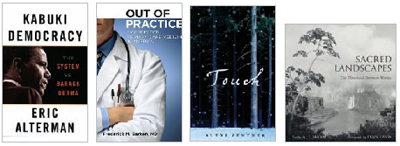The Tiger's Wife by Téa Obreht, MFA '08 (Random House)
The Tiger's Wife by Téa Obreht, MFA '08 (Random House)

Natalia, a young doctor in an unnamed Balkan country, seeks answers about her grandfather's death while she delivers medicine to an orphanage on the other side of the border. She experiences the volatile atmosphere of a city during civil war, and recalls her grandfather's eerie stories of a tiger that wandered from a bombed-out zoo into his childhood village during World War II and his encounters with "the deathless man." Obreht, the youngest writer selected for the New Yorker's "Best 20 Under 40," interweaves myth and memory in this debut novel.

Kabuki Democracy by Eric Alterman '82 (Nation Books). Despite the passage of health reform, financial reform, equal pay legislation, and the economic stimulus, the Obama presidency has been a disappointment to many progressives, argues Alterman, a columnist for the Nation and professor of English and journalism at Brooklyn College and CUNY. While he regrets Obama's decision to become a dealmaker, he places greater blame on our dysfunctional political system for blocking progressive change. What presidents cannot do, he writes, "even with supermajorities in both houses of Congress behind them, is pass the kind of transformative legislation that Barack Obama promised in his 2008 presidential campaign."
Out of Practice by Frederick M. Barken '77, BA '76, MS '77 (Cornell). In 2007, after practicing medicine for almost twenty-five years, Dr. Barken, who now lectures on health-care issues at Ithaca College, made the decision to leave his profession. He had become disillusioned with the bureaucracy of the health insurance industry, price controls, and restrictive regulations. "I was recast as a gate-keeper," he writes, "the fellow at the turn-stile of a veritable health-care amusement park where those with a ticket (a valid health insurance card) could spend an afternoon with a specialist, take a ride in the MRI scanner, or visit the X-ray funhouse."
Touch by Alexi Zentner, MFA '08 (Norton). As his mother lies dying, an Anglican priest recounts his family's history in Sawgamet, a lumber town founded by his near-legendary grandfather deep in Canada's western woods. Magic and mortality are intertwined in this place where the narrator's father and sister disappear under the ice, evil spirits lurk, men die in logjams, snow buries the town until summer, and gold-dusted caribou appear. In his first novel, Zentner evokes the danger and beauty of the wilderness, and the way he delves into his characters' memories recalls Faulkner's adage: "The past is never dead. It's not even past."
Sacred Landscapes by A. T. Mann '65, BArch '66, photographs by Lynn Davis (Sterling). Certain places evoke the sacred in us, argues Mann, and act as a threshold between the human and the divine. "They differ from our usual world in magical and powerful ways," he writes, "resonating with our deeper self, challenging us by their mere presence, and creating such awe in us that we come away feeling ourselves part of a wondrous natural world." The architect and author of Sacred Sexuality juxtaposes photographs of natural formations such as Ayers Rock and Luray Caverns against such man-made structures as the Pyramids, Teotihuacán, and the temple of Angkor Wat.
Fiction
Beyond the Islands by Alicia Yánez Cossío, translated by Amalia Gladhart, PhD '95 (Uno). An associate professor of Spanish at the University of Oregon translates Ecuadorian novelist Yanez Cossío's fictional meditation on the history and people of the Galápagos Islands.
Children's
Argus by Michelle Knudsen '95, illustrated by Andréa Wesson (Candlewick). Sally and her classmates are given eggs to hatch for a science project, but when hers opens it's not a yellow chick but a scaly green dragon that would rather eat the other chicks. In the course of raising the dragon, Sally learns to love what is different.
Non-Fiction
The End of Fundraising by Jason Saul '91 (Jossey-Bass). The CEO of Mission Measurement calls for a change in the way nonprofits raise money. "We continue to market to donors who 'feel good' about our work, rather than mainstream economic actors who 'value' our work," he writes. "We continue to fundraise outside the walls of the economy, when we could be selling our impact within."
Counter Realignment by Howard Reiter '67 and Jeffrey M. Stonecash (Cambridge). The Northeast was once a bastion of the Republican Party. An emeritus professor of political science at the University of Connecticut focuses on how the party, at the same time it gained ground in the South, lost its former stronghold.
Becoming a Mensch by Ronald Pies '74 (Hamilton). Weaving together examples from the Talmud, literature, and philosophy, Pies, a clinical professor of psychiatry at Tufts University School of Medicine and editor-in-chief emeritus of Psychiatric Times, shows how to live ethically in the modern world.
Building Blocks by Gretchen Horlacher '84 (Oxford). An associate professor of music at Indiana University argues against the assessment that Stravinsky's work is static and discontinuous. She demonstrates that while the composer used repetitive textures and dissonance, he grounded his work in traditional ideas of melody and harmony.
Excellence with an Edge by Michael T. Harris '84 (Fire Starter). "Practicing good business lets you in turn practice good medicine," writes Harris, the vice chair of surgery at Mount Sinai School of Medicine. He provides tips on avoiding pitfalls and mastering the business side of health care.


